Contemporary Issues in Hospitality Organizations Across the Globe
VerifiedAdded on 2023/06/12
|11
|3401
|407
Report
AI Summary
This report examines contemporary issues faced by hospitality organizations globally, focusing on challenges such as low customer satisfaction, labor and skills shortages, and the implementation of environmentally friendly practices. It discusses how poor customer service can damage a hotel's reputation and suggests using human relation theory to improve employee satisfaction and customer relations. The report also addresses the shortage of skilled labor, suggesting the use of advanced technologies and employee training to bridge the skills gap. Furthermore, it emphasizes the importance of sustainable practices, such as planting trees, using solar power, and implementing waste management strategies, to minimize environmental impact. The analysis includes practical solutions and theoretical frameworks to help hospitality industries overcome these challenges and improve their overall performance and sustainability. Desklib provides this report as a solved assignment to assist students in understanding and addressing these critical issues in the hospitality sector.
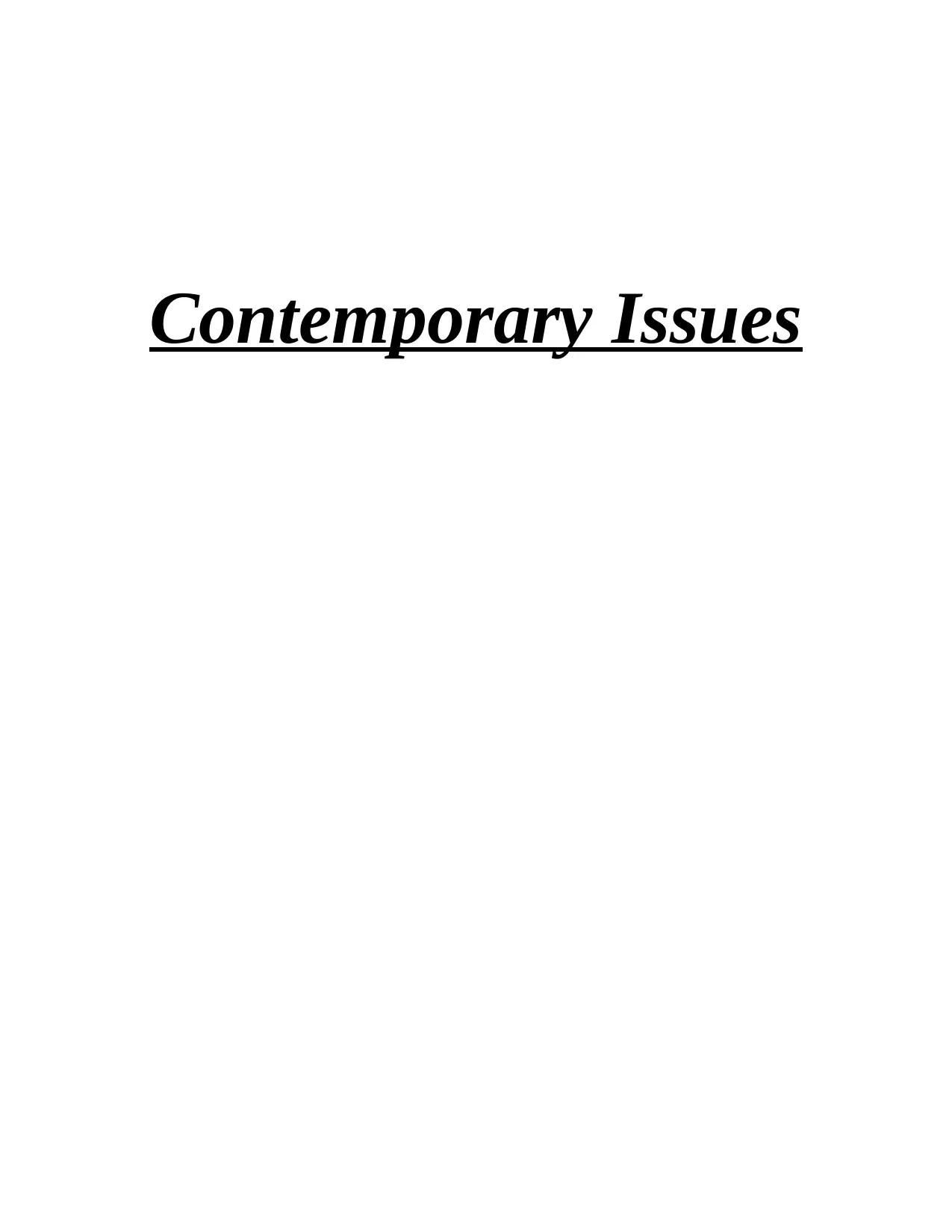
Contemporary Issues
Paraphrase This Document
Need a fresh take? Get an instant paraphrase of this document with our AI Paraphraser
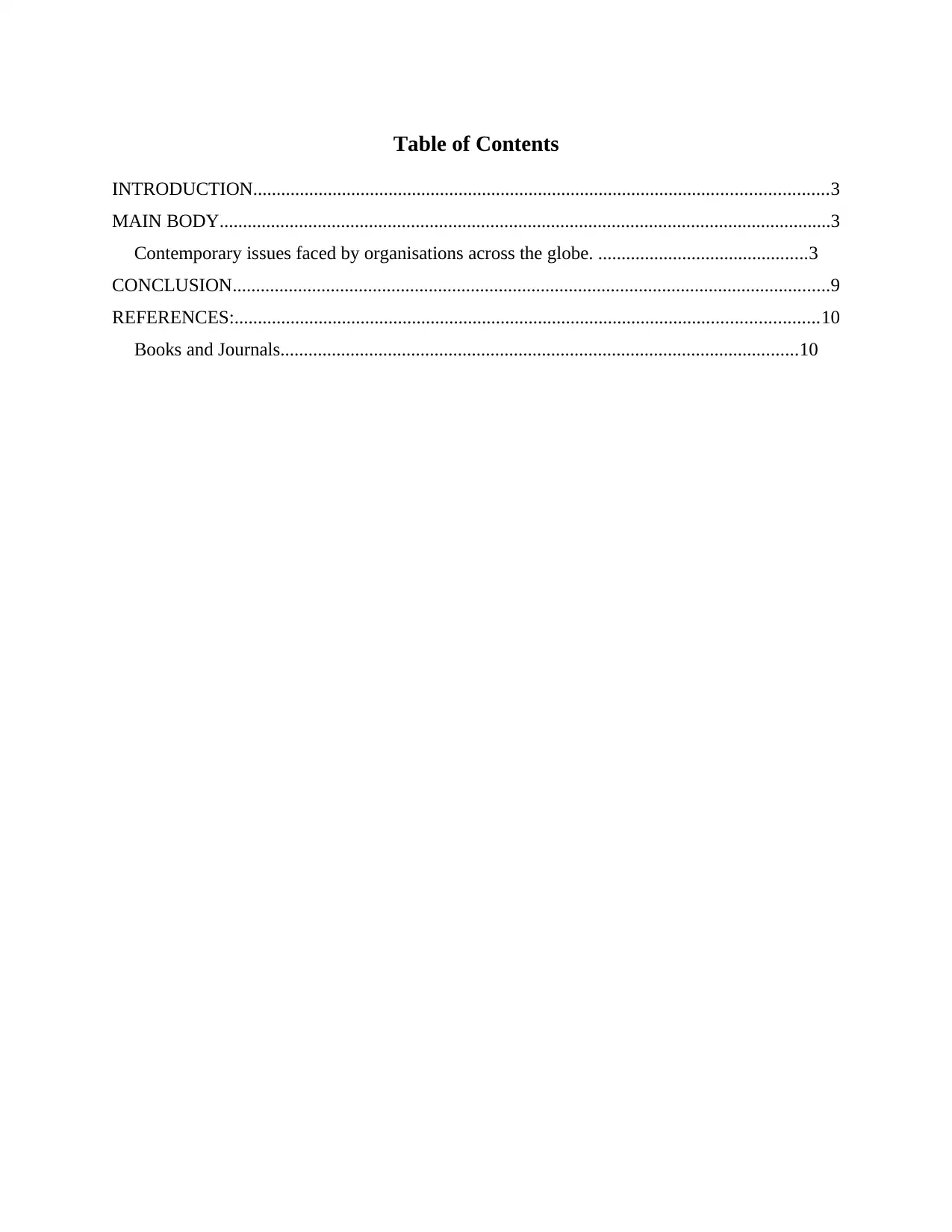
Table of Contents
INTRODUCTION...........................................................................................................................3
MAIN BODY...................................................................................................................................3
Contemporary issues faced by organisations across the globe. .............................................3
CONCLUSION................................................................................................................................9
REFERENCES:.............................................................................................................................10
Books and Journals...............................................................................................................10
INTRODUCTION...........................................................................................................................3
MAIN BODY...................................................................................................................................3
Contemporary issues faced by organisations across the globe. .............................................3
CONCLUSION................................................................................................................................9
REFERENCES:.............................................................................................................................10
Books and Journals...............................................................................................................10
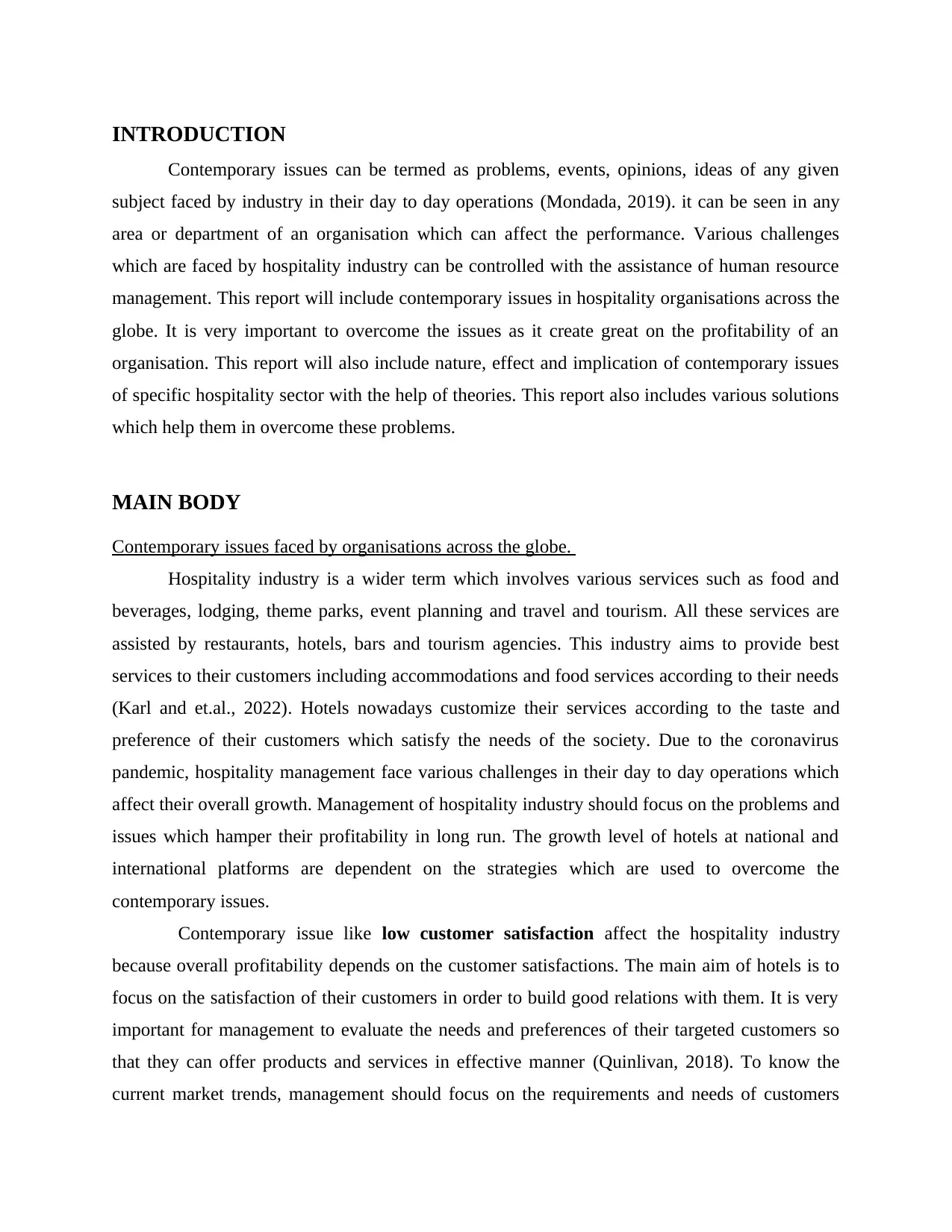
INTRODUCTION
Contemporary issues can be termed as problems, events, opinions, ideas of any given
subject faced by industry in their day to day operations (Mondada, 2019). it can be seen in any
area or department of an organisation which can affect the performance. Various challenges
which are faced by hospitality industry can be controlled with the assistance of human resource
management. This report will include contemporary issues in hospitality organisations across the
globe. It is very important to overcome the issues as it create great on the profitability of an
organisation. This report will also include nature, effect and implication of contemporary issues
of specific hospitality sector with the help of theories. This report also includes various solutions
which help them in overcome these problems.
MAIN BODY
Contemporary issues faced by organisations across the globe.
Hospitality industry is a wider term which involves various services such as food and
beverages, lodging, theme parks, event planning and travel and tourism. All these services are
assisted by restaurants, hotels, bars and tourism agencies. This industry aims to provide best
services to their customers including accommodations and food services according to their needs
(Karl and et.al., 2022). Hotels nowadays customize their services according to the taste and
preference of their customers which satisfy the needs of the society. Due to the coronavirus
pandemic, hospitality management face various challenges in their day to day operations which
affect their overall growth. Management of hospitality industry should focus on the problems and
issues which hamper their profitability in long run. The growth level of hotels at national and
international platforms are dependent on the strategies which are used to overcome the
contemporary issues.
Contemporary issue like low customer satisfaction affect the hospitality industry
because overall profitability depends on the customer satisfactions. The main aim of hotels is to
focus on the satisfaction of their customers in order to build good relations with them. It is very
important for management to evaluate the needs and preferences of their targeted customers so
that they can offer products and services in effective manner (Quinlivan, 2018). To know the
current market trends, management should focus on the requirements and needs of customers
Contemporary issues can be termed as problems, events, opinions, ideas of any given
subject faced by industry in their day to day operations (Mondada, 2019). it can be seen in any
area or department of an organisation which can affect the performance. Various challenges
which are faced by hospitality industry can be controlled with the assistance of human resource
management. This report will include contemporary issues in hospitality organisations across the
globe. It is very important to overcome the issues as it create great on the profitability of an
organisation. This report will also include nature, effect and implication of contemporary issues
of specific hospitality sector with the help of theories. This report also includes various solutions
which help them in overcome these problems.
MAIN BODY
Contemporary issues faced by organisations across the globe.
Hospitality industry is a wider term which involves various services such as food and
beverages, lodging, theme parks, event planning and travel and tourism. All these services are
assisted by restaurants, hotels, bars and tourism agencies. This industry aims to provide best
services to their customers including accommodations and food services according to their needs
(Karl and et.al., 2022). Hotels nowadays customize their services according to the taste and
preference of their customers which satisfy the needs of the society. Due to the coronavirus
pandemic, hospitality management face various challenges in their day to day operations which
affect their overall growth. Management of hospitality industry should focus on the problems and
issues which hamper their profitability in long run. The growth level of hotels at national and
international platforms are dependent on the strategies which are used to overcome the
contemporary issues.
Contemporary issue like low customer satisfaction affect the hospitality industry
because overall profitability depends on the customer satisfactions. The main aim of hotels is to
focus on the satisfaction of their customers in order to build good relations with them. It is very
important for management to evaluate the needs and preferences of their targeted customers so
that they can offer products and services in effective manner (Quinlivan, 2018). To know the
current market trends, management should focus on the requirements and needs of customers
⊘ This is a preview!⊘
Do you want full access?
Subscribe today to unlock all pages.

Trusted by 1+ million students worldwide
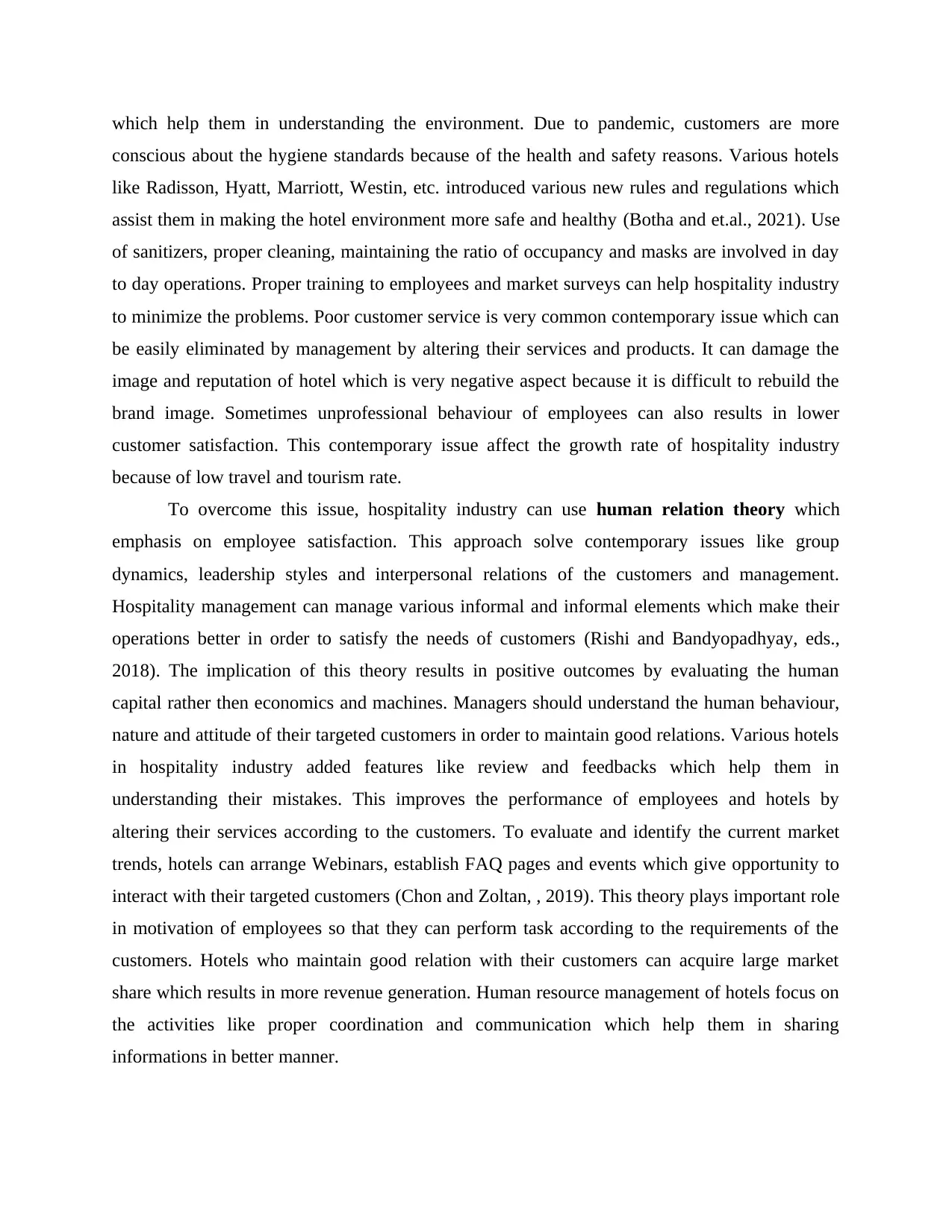
which help them in understanding the environment. Due to pandemic, customers are more
conscious about the hygiene standards because of the health and safety reasons. Various hotels
like Radisson, Hyatt, Marriott, Westin, etc. introduced various new rules and regulations which
assist them in making the hotel environment more safe and healthy (Botha and et.al., 2021). Use
of sanitizers, proper cleaning, maintaining the ratio of occupancy and masks are involved in day
to day operations. Proper training to employees and market surveys can help hospitality industry
to minimize the problems. Poor customer service is very common contemporary issue which can
be easily eliminated by management by altering their services and products. It can damage the
image and reputation of hotel which is very negative aspect because it is difficult to rebuild the
brand image. Sometimes unprofessional behaviour of employees can also results in lower
customer satisfaction. This contemporary issue affect the growth rate of hospitality industry
because of low travel and tourism rate.
To overcome this issue, hospitality industry can use human relation theory which
emphasis on employee satisfaction. This approach solve contemporary issues like group
dynamics, leadership styles and interpersonal relations of the customers and management.
Hospitality management can manage various informal and informal elements which make their
operations better in order to satisfy the needs of customers (Rishi and Bandyopadhyay, eds.,
2018). The implication of this theory results in positive outcomes by evaluating the human
capital rather then economics and machines. Managers should understand the human behaviour,
nature and attitude of their targeted customers in order to maintain good relations. Various hotels
in hospitality industry added features like review and feedbacks which help them in
understanding their mistakes. This improves the performance of employees and hotels by
altering their services according to the customers. To evaluate and identify the current market
trends, hotels can arrange Webinars, establish FAQ pages and events which give opportunity to
interact with their targeted customers (Chon and Zoltan, , 2019). This theory plays important role
in motivation of employees so that they can perform task according to the requirements of the
customers. Hotels who maintain good relation with their customers can acquire large market
share which results in more revenue generation. Human resource management of hotels focus on
the activities like proper coordination and communication which help them in sharing
informations in better manner.
conscious about the hygiene standards because of the health and safety reasons. Various hotels
like Radisson, Hyatt, Marriott, Westin, etc. introduced various new rules and regulations which
assist them in making the hotel environment more safe and healthy (Botha and et.al., 2021). Use
of sanitizers, proper cleaning, maintaining the ratio of occupancy and masks are involved in day
to day operations. Proper training to employees and market surveys can help hospitality industry
to minimize the problems. Poor customer service is very common contemporary issue which can
be easily eliminated by management by altering their services and products. It can damage the
image and reputation of hotel which is very negative aspect because it is difficult to rebuild the
brand image. Sometimes unprofessional behaviour of employees can also results in lower
customer satisfaction. This contemporary issue affect the growth rate of hospitality industry
because of low travel and tourism rate.
To overcome this issue, hospitality industry can use human relation theory which
emphasis on employee satisfaction. This approach solve contemporary issues like group
dynamics, leadership styles and interpersonal relations of the customers and management.
Hospitality management can manage various informal and informal elements which make their
operations better in order to satisfy the needs of customers (Rishi and Bandyopadhyay, eds.,
2018). The implication of this theory results in positive outcomes by evaluating the human
capital rather then economics and machines. Managers should understand the human behaviour,
nature and attitude of their targeted customers in order to maintain good relations. Various hotels
in hospitality industry added features like review and feedbacks which help them in
understanding their mistakes. This improves the performance of employees and hotels by
altering their services according to the customers. To evaluate and identify the current market
trends, hotels can arrange Webinars, establish FAQ pages and events which give opportunity to
interact with their targeted customers (Chon and Zoltan, , 2019). This theory plays important role
in motivation of employees so that they can perform task according to the requirements of the
customers. Hotels who maintain good relation with their customers can acquire large market
share which results in more revenue generation. Human resource management of hotels focus on
the activities like proper coordination and communication which help them in sharing
informations in better manner.
Paraphrase This Document
Need a fresh take? Get an instant paraphrase of this document with our AI Paraphraser
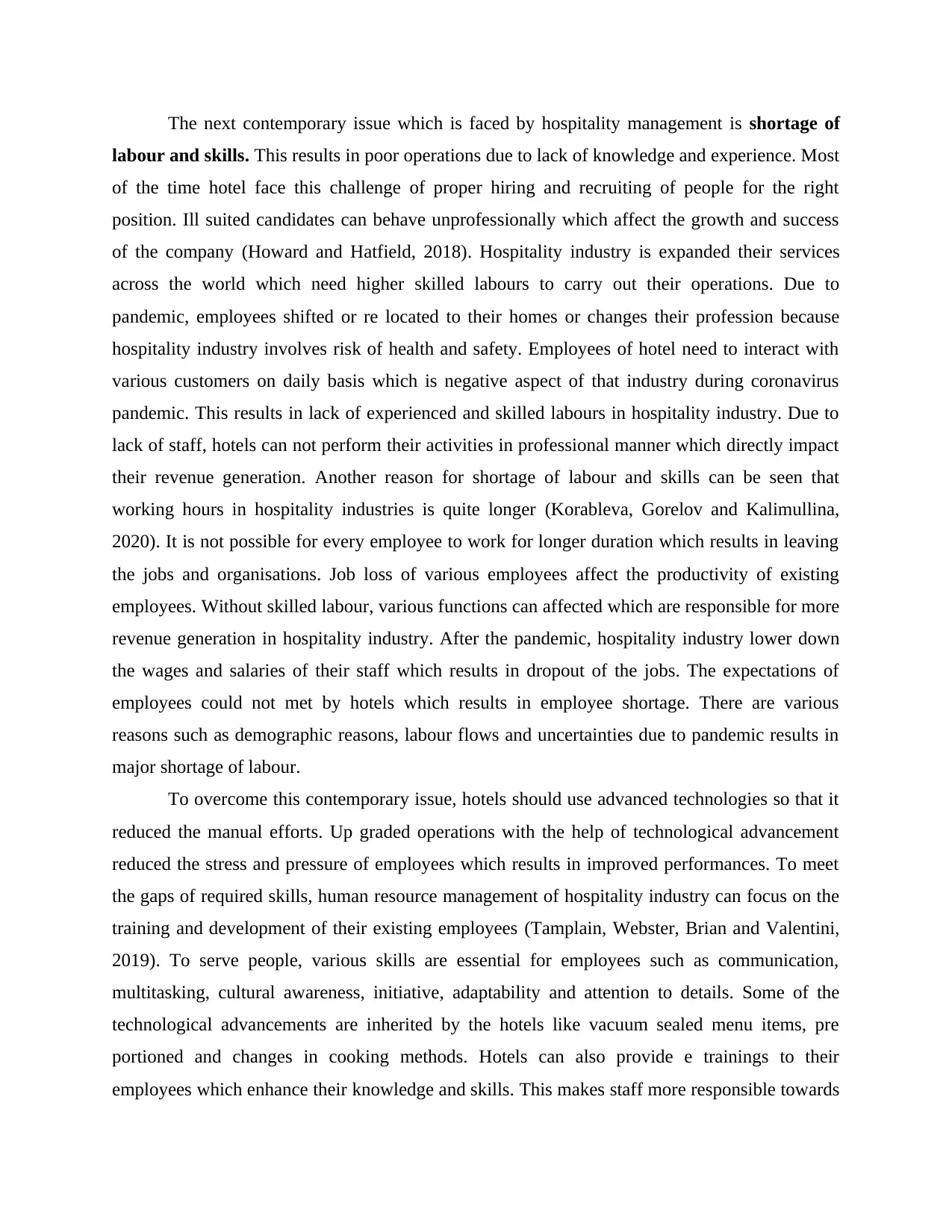
The next contemporary issue which is faced by hospitality management is shortage of
labour and skills. This results in poor operations due to lack of knowledge and experience. Most
of the time hotel face this challenge of proper hiring and recruiting of people for the right
position. Ill suited candidates can behave unprofessionally which affect the growth and success
of the company (Howard and Hatfield, 2018). Hospitality industry is expanded their services
across the world which need higher skilled labours to carry out their operations. Due to
pandemic, employees shifted or re located to their homes or changes their profession because
hospitality industry involves risk of health and safety. Employees of hotel need to interact with
various customers on daily basis which is negative aspect of that industry during coronavirus
pandemic. This results in lack of experienced and skilled labours in hospitality industry. Due to
lack of staff, hotels can not perform their activities in professional manner which directly impact
their revenue generation. Another reason for shortage of labour and skills can be seen that
working hours in hospitality industries is quite longer (Korableva, Gorelov and Kalimullina,
2020). It is not possible for every employee to work for longer duration which results in leaving
the jobs and organisations. Job loss of various employees affect the productivity of existing
employees. Without skilled labour, various functions can affected which are responsible for more
revenue generation in hospitality industry. After the pandemic, hospitality industry lower down
the wages and salaries of their staff which results in dropout of the jobs. The expectations of
employees could not met by hotels which results in employee shortage. There are various
reasons such as demographic reasons, labour flows and uncertainties due to pandemic results in
major shortage of labour.
To overcome this contemporary issue, hotels should use advanced technologies so that it
reduced the manual efforts. Up graded operations with the help of technological advancement
reduced the stress and pressure of employees which results in improved performances. To meet
the gaps of required skills, human resource management of hospitality industry can focus on the
training and development of their existing employees (Tamplain, Webster, Brian and Valentini,
2019). To serve people, various skills are essential for employees such as communication,
multitasking, cultural awareness, initiative, adaptability and attention to details. Some of the
technological advancements are inherited by the hotels like vacuum sealed menu items, pre
portioned and changes in cooking methods. Hotels can also provide e trainings to their
employees which enhance their knowledge and skills. This makes staff more responsible towards
labour and skills. This results in poor operations due to lack of knowledge and experience. Most
of the time hotel face this challenge of proper hiring and recruiting of people for the right
position. Ill suited candidates can behave unprofessionally which affect the growth and success
of the company (Howard and Hatfield, 2018). Hospitality industry is expanded their services
across the world which need higher skilled labours to carry out their operations. Due to
pandemic, employees shifted or re located to their homes or changes their profession because
hospitality industry involves risk of health and safety. Employees of hotel need to interact with
various customers on daily basis which is negative aspect of that industry during coronavirus
pandemic. This results in lack of experienced and skilled labours in hospitality industry. Due to
lack of staff, hotels can not perform their activities in professional manner which directly impact
their revenue generation. Another reason for shortage of labour and skills can be seen that
working hours in hospitality industries is quite longer (Korableva, Gorelov and Kalimullina,
2020). It is not possible for every employee to work for longer duration which results in leaving
the jobs and organisations. Job loss of various employees affect the productivity of existing
employees. Without skilled labour, various functions can affected which are responsible for more
revenue generation in hospitality industry. After the pandemic, hospitality industry lower down
the wages and salaries of their staff which results in dropout of the jobs. The expectations of
employees could not met by hotels which results in employee shortage. There are various
reasons such as demographic reasons, labour flows and uncertainties due to pandemic results in
major shortage of labour.
To overcome this contemporary issue, hotels should use advanced technologies so that it
reduced the manual efforts. Up graded operations with the help of technological advancement
reduced the stress and pressure of employees which results in improved performances. To meet
the gaps of required skills, human resource management of hospitality industry can focus on the
training and development of their existing employees (Tamplain, Webster, Brian and Valentini,
2019). To serve people, various skills are essential for employees such as communication,
multitasking, cultural awareness, initiative, adaptability and attention to details. Some of the
technological advancements are inherited by the hotels like vacuum sealed menu items, pre
portioned and changes in cooking methods. Hotels can also provide e trainings to their
employees which enhance their knowledge and skills. This makes staff more responsible towards
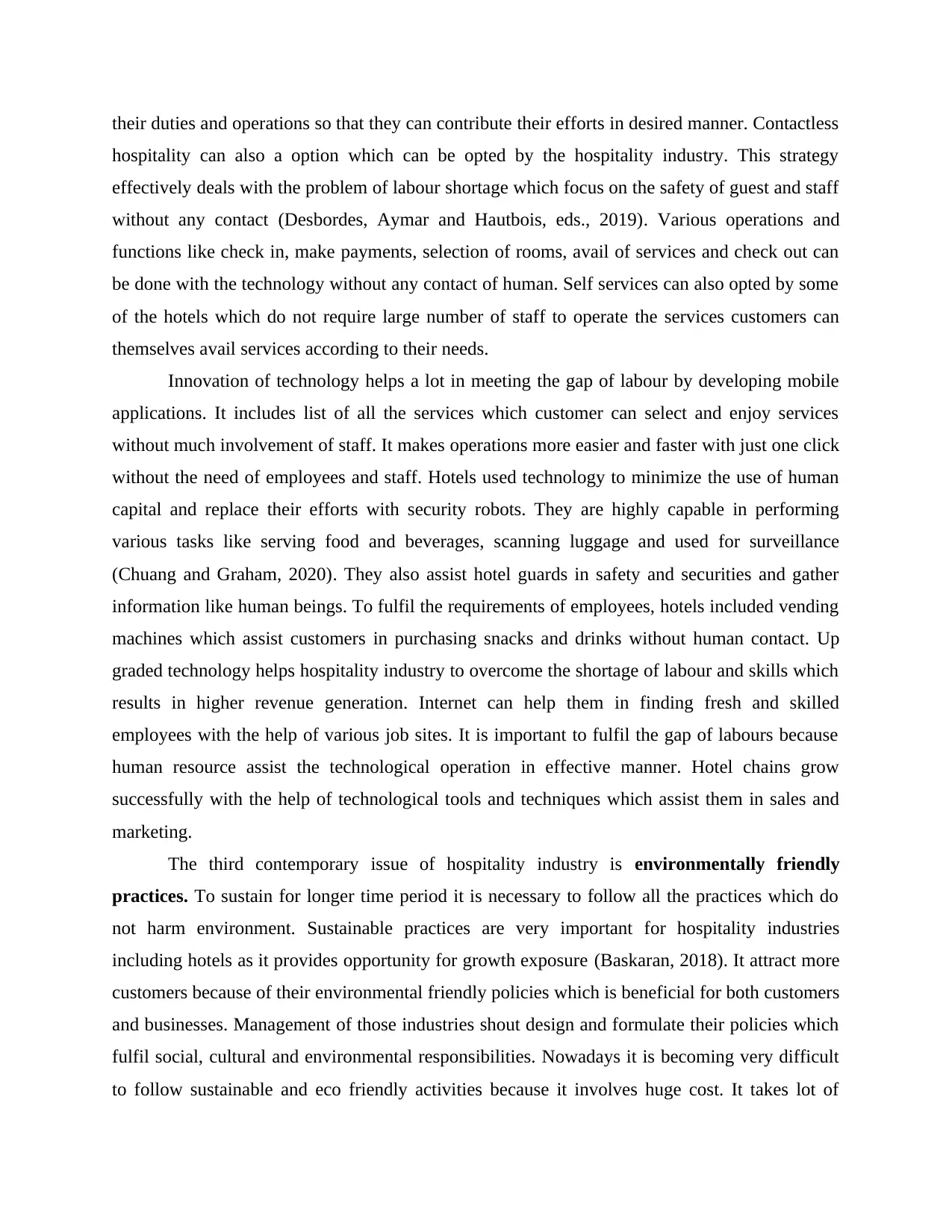
their duties and operations so that they can contribute their efforts in desired manner. Contactless
hospitality can also a option which can be opted by the hospitality industry. This strategy
effectively deals with the problem of labour shortage which focus on the safety of guest and staff
without any contact (Desbordes, Aymar and Hautbois, eds., 2019). Various operations and
functions like check in, make payments, selection of rooms, avail of services and check out can
be done with the technology without any contact of human. Self services can also opted by some
of the hotels which do not require large number of staff to operate the services customers can
themselves avail services according to their needs.
Innovation of technology helps a lot in meeting the gap of labour by developing mobile
applications. It includes list of all the services which customer can select and enjoy services
without much involvement of staff. It makes operations more easier and faster with just one click
without the need of employees and staff. Hotels used technology to minimize the use of human
capital and replace their efforts with security robots. They are highly capable in performing
various tasks like serving food and beverages, scanning luggage and used for surveillance
(Chuang and Graham, 2020). They also assist hotel guards in safety and securities and gather
information like human beings. To fulfil the requirements of employees, hotels included vending
machines which assist customers in purchasing snacks and drinks without human contact. Up
graded technology helps hospitality industry to overcome the shortage of labour and skills which
results in higher revenue generation. Internet can help them in finding fresh and skilled
employees with the help of various job sites. It is important to fulfil the gap of labours because
human resource assist the technological operation in effective manner. Hotel chains grow
successfully with the help of technological tools and techniques which assist them in sales and
marketing.
The third contemporary issue of hospitality industry is environmentally friendly
practices. To sustain for longer time period it is necessary to follow all the practices which do
not harm environment. Sustainable practices are very important for hospitality industries
including hotels as it provides opportunity for growth exposure (Baskaran, 2018). It attract more
customers because of their environmental friendly policies which is beneficial for both customers
and businesses. Management of those industries shout design and formulate their policies which
fulfil social, cultural and environmental responsibilities. Nowadays it is becoming very difficult
to follow sustainable and eco friendly activities because it involves huge cost. It takes lot of
hospitality can also a option which can be opted by the hospitality industry. This strategy
effectively deals with the problem of labour shortage which focus on the safety of guest and staff
without any contact (Desbordes, Aymar and Hautbois, eds., 2019). Various operations and
functions like check in, make payments, selection of rooms, avail of services and check out can
be done with the technology without any contact of human. Self services can also opted by some
of the hotels which do not require large number of staff to operate the services customers can
themselves avail services according to their needs.
Innovation of technology helps a lot in meeting the gap of labour by developing mobile
applications. It includes list of all the services which customer can select and enjoy services
without much involvement of staff. It makes operations more easier and faster with just one click
without the need of employees and staff. Hotels used technology to minimize the use of human
capital and replace their efforts with security robots. They are highly capable in performing
various tasks like serving food and beverages, scanning luggage and used for surveillance
(Chuang and Graham, 2020). They also assist hotel guards in safety and securities and gather
information like human beings. To fulfil the requirements of employees, hotels included vending
machines which assist customers in purchasing snacks and drinks without human contact. Up
graded technology helps hospitality industry to overcome the shortage of labour and skills which
results in higher revenue generation. Internet can help them in finding fresh and skilled
employees with the help of various job sites. It is important to fulfil the gap of labours because
human resource assist the technological operation in effective manner. Hotel chains grow
successfully with the help of technological tools and techniques which assist them in sales and
marketing.
The third contemporary issue of hospitality industry is environmentally friendly
practices. To sustain for longer time period it is necessary to follow all the practices which do
not harm environment. Sustainable practices are very important for hospitality industries
including hotels as it provides opportunity for growth exposure (Baskaran, 2018). It attract more
customers because of their environmental friendly policies which is beneficial for both customers
and businesses. Management of those industries shout design and formulate their policies which
fulfil social, cultural and environmental responsibilities. Nowadays it is becoming very difficult
to follow sustainable and eco friendly activities because it involves huge cost. It takes lot of
⊘ This is a preview!⊘
Do you want full access?
Subscribe today to unlock all pages.

Trusted by 1+ million students worldwide
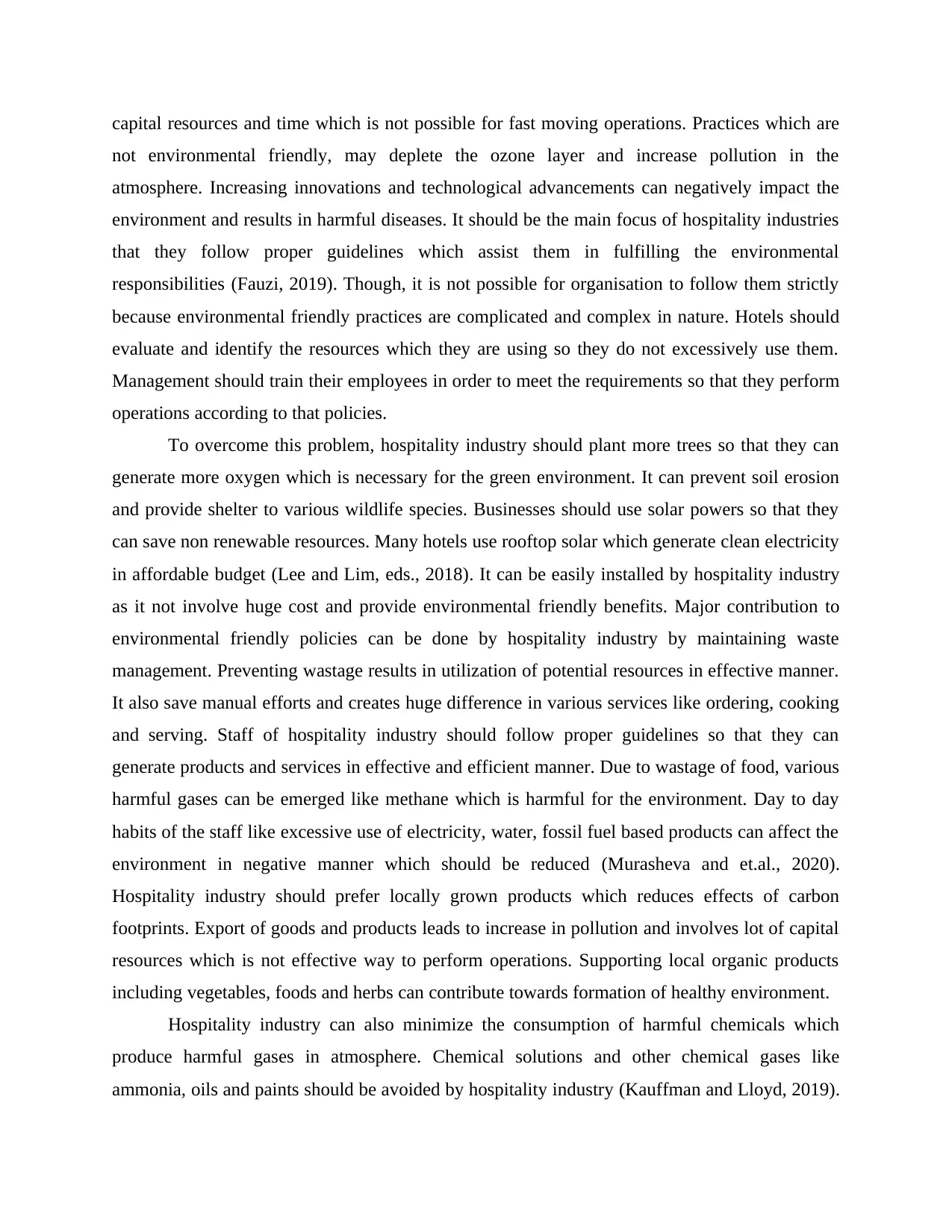
capital resources and time which is not possible for fast moving operations. Practices which are
not environmental friendly, may deplete the ozone layer and increase pollution in the
atmosphere. Increasing innovations and technological advancements can negatively impact the
environment and results in harmful diseases. It should be the main focus of hospitality industries
that they follow proper guidelines which assist them in fulfilling the environmental
responsibilities (Fauzi, 2019). Though, it is not possible for organisation to follow them strictly
because environmental friendly practices are complicated and complex in nature. Hotels should
evaluate and identify the resources which they are using so they do not excessively use them.
Management should train their employees in order to meet the requirements so that they perform
operations according to that policies.
To overcome this problem, hospitality industry should plant more trees so that they can
generate more oxygen which is necessary for the green environment. It can prevent soil erosion
and provide shelter to various wildlife species. Businesses should use solar powers so that they
can save non renewable resources. Many hotels use rooftop solar which generate clean electricity
in affordable budget (Lee and Lim, eds., 2018). It can be easily installed by hospitality industry
as it not involve huge cost and provide environmental friendly benefits. Major contribution to
environmental friendly policies can be done by hospitality industry by maintaining waste
management. Preventing wastage results in utilization of potential resources in effective manner.
It also save manual efforts and creates huge difference in various services like ordering, cooking
and serving. Staff of hospitality industry should follow proper guidelines so that they can
generate products and services in effective and efficient manner. Due to wastage of food, various
harmful gases can be emerged like methane which is harmful for the environment. Day to day
habits of the staff like excessive use of electricity, water, fossil fuel based products can affect the
environment in negative manner which should be reduced (Murasheva and et.al., 2020).
Hospitality industry should prefer locally grown products which reduces effects of carbon
footprints. Export of goods and products leads to increase in pollution and involves lot of capital
resources which is not effective way to perform operations. Supporting local organic products
including vegetables, foods and herbs can contribute towards formation of healthy environment.
Hospitality industry can also minimize the consumption of harmful chemicals which
produce harmful gases in atmosphere. Chemical solutions and other chemical gases like
ammonia, oils and paints should be avoided by hospitality industry (Kauffman and Lloyd, 2019).
not environmental friendly, may deplete the ozone layer and increase pollution in the
atmosphere. Increasing innovations and technological advancements can negatively impact the
environment and results in harmful diseases. It should be the main focus of hospitality industries
that they follow proper guidelines which assist them in fulfilling the environmental
responsibilities (Fauzi, 2019). Though, it is not possible for organisation to follow them strictly
because environmental friendly practices are complicated and complex in nature. Hotels should
evaluate and identify the resources which they are using so they do not excessively use them.
Management should train their employees in order to meet the requirements so that they perform
operations according to that policies.
To overcome this problem, hospitality industry should plant more trees so that they can
generate more oxygen which is necessary for the green environment. It can prevent soil erosion
and provide shelter to various wildlife species. Businesses should use solar powers so that they
can save non renewable resources. Many hotels use rooftop solar which generate clean electricity
in affordable budget (Lee and Lim, eds., 2018). It can be easily installed by hospitality industry
as it not involve huge cost and provide environmental friendly benefits. Major contribution to
environmental friendly policies can be done by hospitality industry by maintaining waste
management. Preventing wastage results in utilization of potential resources in effective manner.
It also save manual efforts and creates huge difference in various services like ordering, cooking
and serving. Staff of hospitality industry should follow proper guidelines so that they can
generate products and services in effective and efficient manner. Due to wastage of food, various
harmful gases can be emerged like methane which is harmful for the environment. Day to day
habits of the staff like excessive use of electricity, water, fossil fuel based products can affect the
environment in negative manner which should be reduced (Murasheva and et.al., 2020).
Hospitality industry should prefer locally grown products which reduces effects of carbon
footprints. Export of goods and products leads to increase in pollution and involves lot of capital
resources which is not effective way to perform operations. Supporting local organic products
including vegetables, foods and herbs can contribute towards formation of healthy environment.
Hospitality industry can also minimize the consumption of harmful chemicals which
produce harmful gases in atmosphere. Chemical solutions and other chemical gases like
ammonia, oils and paints should be avoided by hospitality industry (Kauffman and Lloyd, 2019).
Paraphrase This Document
Need a fresh take? Get an instant paraphrase of this document with our AI Paraphraser
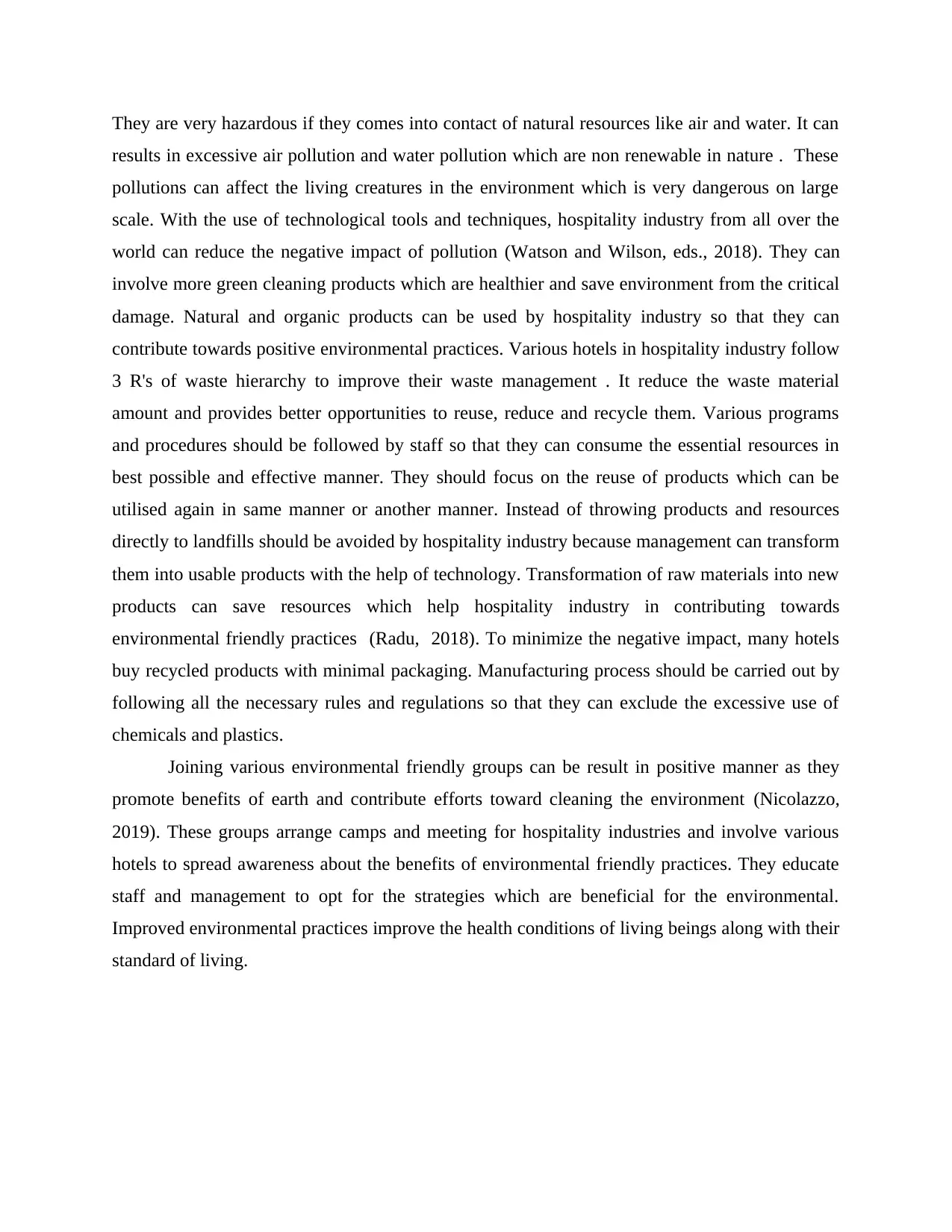
They are very hazardous if they comes into contact of natural resources like air and water. It can
results in excessive air pollution and water pollution which are non renewable in nature . These
pollutions can affect the living creatures in the environment which is very dangerous on large
scale. With the use of technological tools and techniques, hospitality industry from all over the
world can reduce the negative impact of pollution (Watson and Wilson, eds., 2018). They can
involve more green cleaning products which are healthier and save environment from the critical
damage. Natural and organic products can be used by hospitality industry so that they can
contribute towards positive environmental practices. Various hotels in hospitality industry follow
3 R's of waste hierarchy to improve their waste management . It reduce the waste material
amount and provides better opportunities to reuse, reduce and recycle them. Various programs
and procedures should be followed by staff so that they can consume the essential resources in
best possible and effective manner. They should focus on the reuse of products which can be
utilised again in same manner or another manner. Instead of throwing products and resources
directly to landfills should be avoided by hospitality industry because management can transform
them into usable products with the help of technology. Transformation of raw materials into new
products can save resources which help hospitality industry in contributing towards
environmental friendly practices (Radu, 2018). To minimize the negative impact, many hotels
buy recycled products with minimal packaging. Manufacturing process should be carried out by
following all the necessary rules and regulations so that they can exclude the excessive use of
chemicals and plastics.
Joining various environmental friendly groups can be result in positive manner as they
promote benefits of earth and contribute efforts toward cleaning the environment (Nicolazzo,
2019). These groups arrange camps and meeting for hospitality industries and involve various
hotels to spread awareness about the benefits of environmental friendly practices. They educate
staff and management to opt for the strategies which are beneficial for the environmental.
Improved environmental practices improve the health conditions of living beings along with their
standard of living.
results in excessive air pollution and water pollution which are non renewable in nature . These
pollutions can affect the living creatures in the environment which is very dangerous on large
scale. With the use of technological tools and techniques, hospitality industry from all over the
world can reduce the negative impact of pollution (Watson and Wilson, eds., 2018). They can
involve more green cleaning products which are healthier and save environment from the critical
damage. Natural and organic products can be used by hospitality industry so that they can
contribute towards positive environmental practices. Various hotels in hospitality industry follow
3 R's of waste hierarchy to improve their waste management . It reduce the waste material
amount and provides better opportunities to reuse, reduce and recycle them. Various programs
and procedures should be followed by staff so that they can consume the essential resources in
best possible and effective manner. They should focus on the reuse of products which can be
utilised again in same manner or another manner. Instead of throwing products and resources
directly to landfills should be avoided by hospitality industry because management can transform
them into usable products with the help of technology. Transformation of raw materials into new
products can save resources which help hospitality industry in contributing towards
environmental friendly practices (Radu, 2018). To minimize the negative impact, many hotels
buy recycled products with minimal packaging. Manufacturing process should be carried out by
following all the necessary rules and regulations so that they can exclude the excessive use of
chemicals and plastics.
Joining various environmental friendly groups can be result in positive manner as they
promote benefits of earth and contribute efforts toward cleaning the environment (Nicolazzo,
2019). These groups arrange camps and meeting for hospitality industries and involve various
hotels to spread awareness about the benefits of environmental friendly practices. They educate
staff and management to opt for the strategies which are beneficial for the environmental.
Improved environmental practices improve the health conditions of living beings along with their
standard of living.
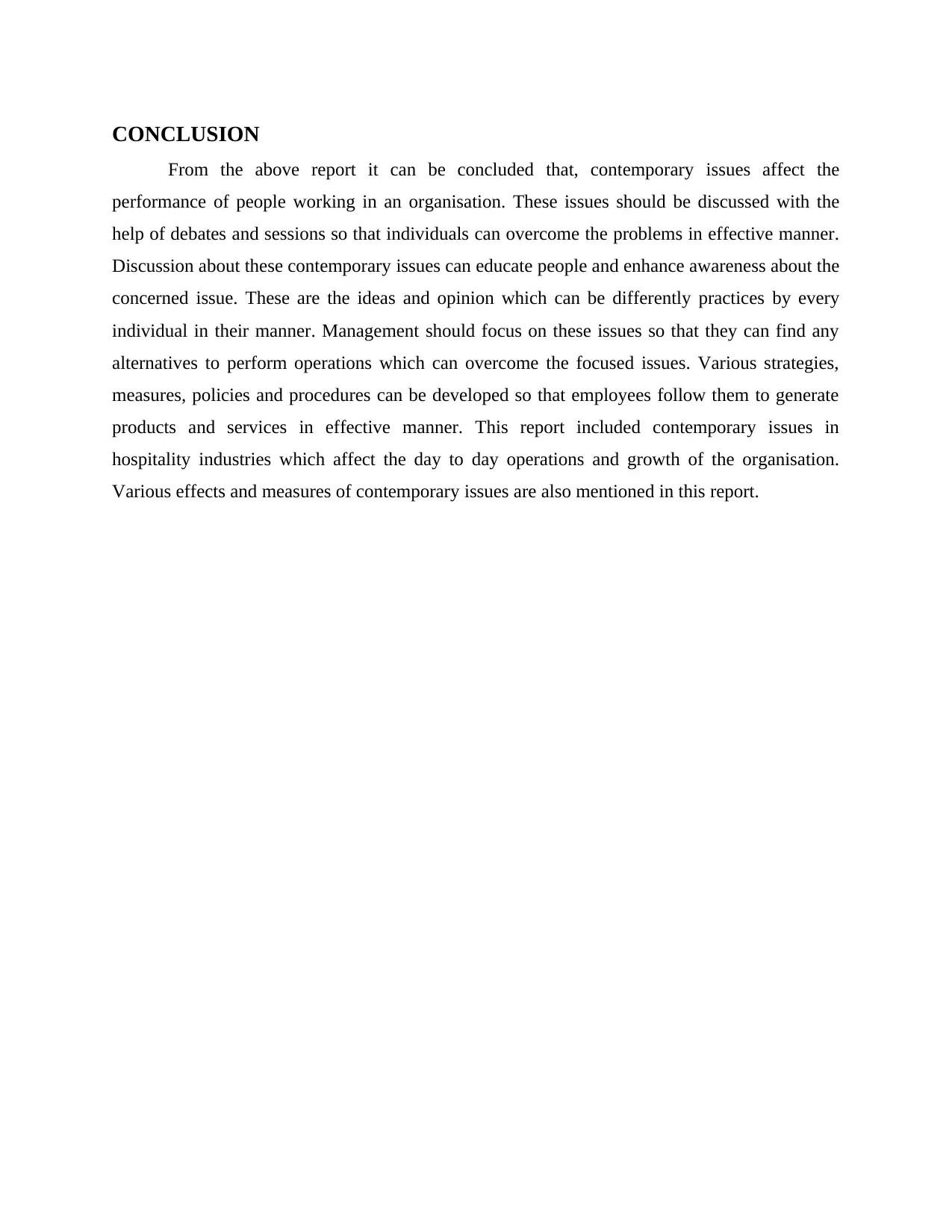
CONCLUSION
From the above report it can be concluded that, contemporary issues affect the
performance of people working in an organisation. These issues should be discussed with the
help of debates and sessions so that individuals can overcome the problems in effective manner.
Discussion about these contemporary issues can educate people and enhance awareness about the
concerned issue. These are the ideas and opinion which can be differently practices by every
individual in their manner. Management should focus on these issues so that they can find any
alternatives to perform operations which can overcome the focused issues. Various strategies,
measures, policies and procedures can be developed so that employees follow them to generate
products and services in effective manner. This report included contemporary issues in
hospitality industries which affect the day to day operations and growth of the organisation.
Various effects and measures of contemporary issues are also mentioned in this report.
From the above report it can be concluded that, contemporary issues affect the
performance of people working in an organisation. These issues should be discussed with the
help of debates and sessions so that individuals can overcome the problems in effective manner.
Discussion about these contemporary issues can educate people and enhance awareness about the
concerned issue. These are the ideas and opinion which can be differently practices by every
individual in their manner. Management should focus on these issues so that they can find any
alternatives to perform operations which can overcome the focused issues. Various strategies,
measures, policies and procedures can be developed so that employees follow them to generate
products and services in effective manner. This report included contemporary issues in
hospitality industries which affect the day to day operations and growth of the organisation.
Various effects and measures of contemporary issues are also mentioned in this report.
⊘ This is a preview!⊘
Do you want full access?
Subscribe today to unlock all pages.

Trusted by 1+ million students worldwide
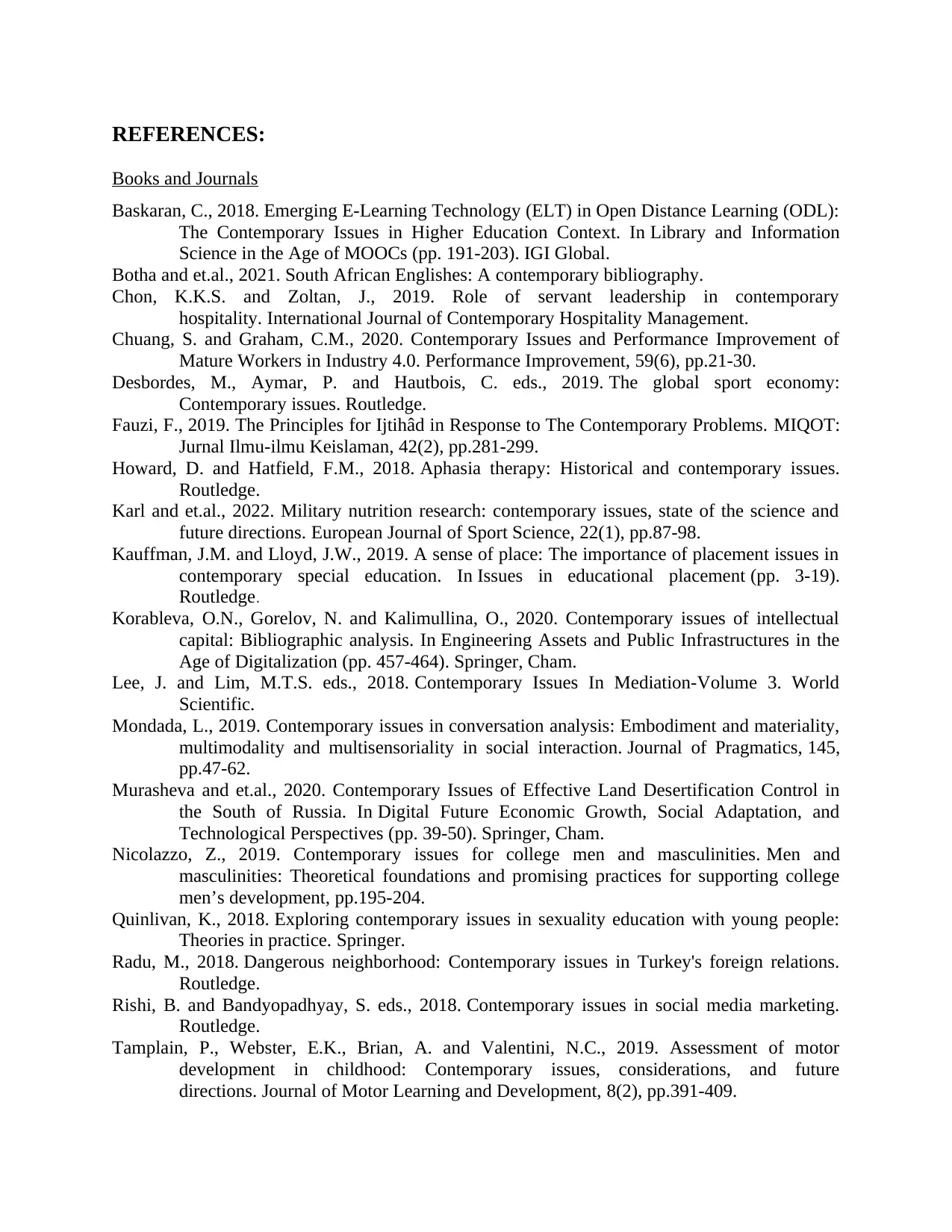
REFERENCES:
Books and Journals
Baskaran, C., 2018. Emerging E-Learning Technology (ELT) in Open Distance Learning (ODL):
The Contemporary Issues in Higher Education Context. In Library and Information
Science in the Age of MOOCs (pp. 191-203). IGI Global.
Botha and et.al., 2021. South African Englishes: A contemporary bibliography.
Chon, K.K.S. and Zoltan, J., 2019. Role of servant leadership in contemporary
hospitality. International Journal of Contemporary Hospitality Management.
Chuang, S. and Graham, C.M., 2020. Contemporary Issues and Performance Improvement of
Mature Workers in Industry 4.0. Performance Improvement, 59(6), pp.21-30.
Desbordes, M., Aymar, P. and Hautbois, C. eds., 2019. The global sport economy:
Contemporary issues. Routledge.
Fauzi, F., 2019. The Principles for Ijtihâd in Response to The Contemporary Problems. MIQOT:
Jurnal Ilmu-ilmu Keislaman, 42(2), pp.281-299.
Howard, D. and Hatfield, F.M., 2018. Aphasia therapy: Historical and contemporary issues.
Routledge.
Karl and et.al., 2022. Military nutrition research: contemporary issues, state of the science and
future directions. European Journal of Sport Science, 22(1), pp.87-98.
Kauffman, J.M. and Lloyd, J.W., 2019. A sense of place: The importance of placement issues in
contemporary special education. In Issues in educational placement (pp. 3-19).
Routledge.
Korableva, O.N., Gorelov, N. and Kalimullina, O., 2020. Contemporary issues of intellectual
capital: Bibliographic analysis. In Engineering Assets and Public Infrastructures in the
Age of Digitalization (pp. 457-464). Springer, Cham.
Lee, J. and Lim, M.T.S. eds., 2018. Contemporary Issues In Mediation-Volume 3. World
Scientific.
Mondada, L., 2019. Contemporary issues in conversation analysis: Embodiment and materiality,
multimodality and multisensoriality in social interaction. Journal of Pragmatics, 145,
pp.47-62.
Murasheva and et.al., 2020. Contemporary Issues of Effective Land Desertification Control in
the South of Russia. In Digital Future Economic Growth, Social Adaptation, and
Technological Perspectives (pp. 39-50). Springer, Cham.
Nicolazzo, Z., 2019. Contemporary issues for college men and masculinities. Men and
masculinities: Theoretical foundations and promising practices for supporting college
men’s development, pp.195-204.
Quinlivan, K., 2018. Exploring contemporary issues in sexuality education with young people:
Theories in practice. Springer.
Radu, M., 2018. Dangerous neighborhood: Contemporary issues in Turkey's foreign relations.
Routledge.
Rishi, B. and Bandyopadhyay, S. eds., 2018. Contemporary issues in social media marketing.
Routledge.
Tamplain, P., Webster, E.K., Brian, A. and Valentini, N.C., 2019. Assessment of motor
development in childhood: Contemporary issues, considerations, and future
directions. Journal of Motor Learning and Development, 8(2), pp.391-409.
Books and Journals
Baskaran, C., 2018. Emerging E-Learning Technology (ELT) in Open Distance Learning (ODL):
The Contemporary Issues in Higher Education Context. In Library and Information
Science in the Age of MOOCs (pp. 191-203). IGI Global.
Botha and et.al., 2021. South African Englishes: A contemporary bibliography.
Chon, K.K.S. and Zoltan, J., 2019. Role of servant leadership in contemporary
hospitality. International Journal of Contemporary Hospitality Management.
Chuang, S. and Graham, C.M., 2020. Contemporary Issues and Performance Improvement of
Mature Workers in Industry 4.0. Performance Improvement, 59(6), pp.21-30.
Desbordes, M., Aymar, P. and Hautbois, C. eds., 2019. The global sport economy:
Contemporary issues. Routledge.
Fauzi, F., 2019. The Principles for Ijtihâd in Response to The Contemporary Problems. MIQOT:
Jurnal Ilmu-ilmu Keislaman, 42(2), pp.281-299.
Howard, D. and Hatfield, F.M., 2018. Aphasia therapy: Historical and contemporary issues.
Routledge.
Karl and et.al., 2022. Military nutrition research: contemporary issues, state of the science and
future directions. European Journal of Sport Science, 22(1), pp.87-98.
Kauffman, J.M. and Lloyd, J.W., 2019. A sense of place: The importance of placement issues in
contemporary special education. In Issues in educational placement (pp. 3-19).
Routledge.
Korableva, O.N., Gorelov, N. and Kalimullina, O., 2020. Contemporary issues of intellectual
capital: Bibliographic analysis. In Engineering Assets and Public Infrastructures in the
Age of Digitalization (pp. 457-464). Springer, Cham.
Lee, J. and Lim, M.T.S. eds., 2018. Contemporary Issues In Mediation-Volume 3. World
Scientific.
Mondada, L., 2019. Contemporary issues in conversation analysis: Embodiment and materiality,
multimodality and multisensoriality in social interaction. Journal of Pragmatics, 145,
pp.47-62.
Murasheva and et.al., 2020. Contemporary Issues of Effective Land Desertification Control in
the South of Russia. In Digital Future Economic Growth, Social Adaptation, and
Technological Perspectives (pp. 39-50). Springer, Cham.
Nicolazzo, Z., 2019. Contemporary issues for college men and masculinities. Men and
masculinities: Theoretical foundations and promising practices for supporting college
men’s development, pp.195-204.
Quinlivan, K., 2018. Exploring contemporary issues in sexuality education with young people:
Theories in practice. Springer.
Radu, M., 2018. Dangerous neighborhood: Contemporary issues in Turkey's foreign relations.
Routledge.
Rishi, B. and Bandyopadhyay, S. eds., 2018. Contemporary issues in social media marketing.
Routledge.
Tamplain, P., Webster, E.K., Brian, A. and Valentini, N.C., 2019. Assessment of motor
development in childhood: Contemporary issues, considerations, and future
directions. Journal of Motor Learning and Development, 8(2), pp.391-409.
Paraphrase This Document
Need a fresh take? Get an instant paraphrase of this document with our AI Paraphraser
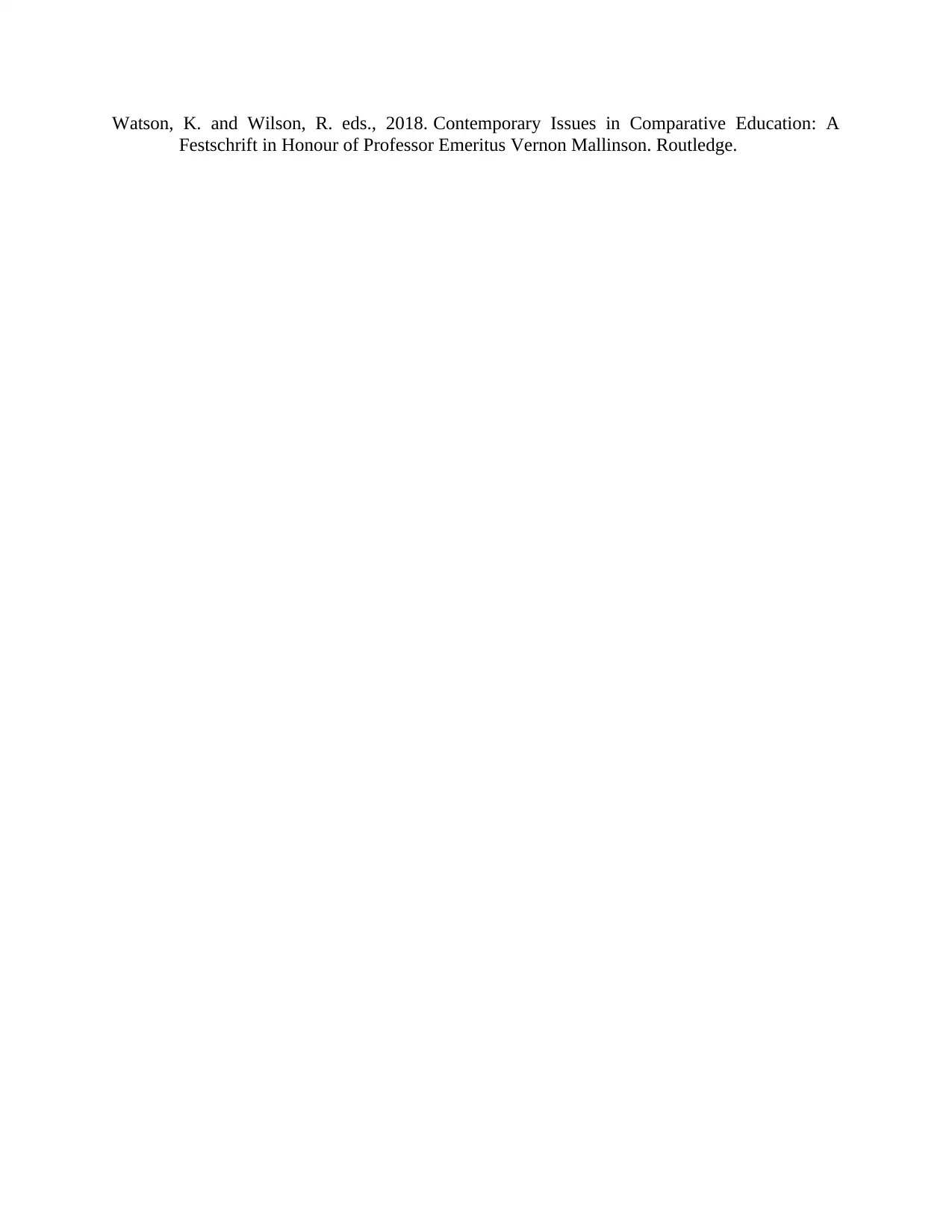
Watson, K. and Wilson, R. eds., 2018. Contemporary Issues in Comparative Education: A
Festschrift in Honour of Professor Emeritus Vernon Mallinson. Routledge.
Festschrift in Honour of Professor Emeritus Vernon Mallinson. Routledge.
1 out of 11
Related Documents
Your All-in-One AI-Powered Toolkit for Academic Success.
+13062052269
info@desklib.com
Available 24*7 on WhatsApp / Email
![[object Object]](/_next/static/media/star-bottom.7253800d.svg)
Unlock your academic potential
Copyright © 2020–2026 A2Z Services. All Rights Reserved. Developed and managed by ZUCOL.




